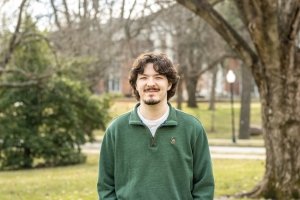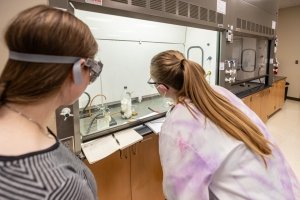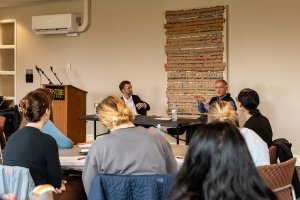Atkins Scholars enjoy support, encouragement for undergraduate research
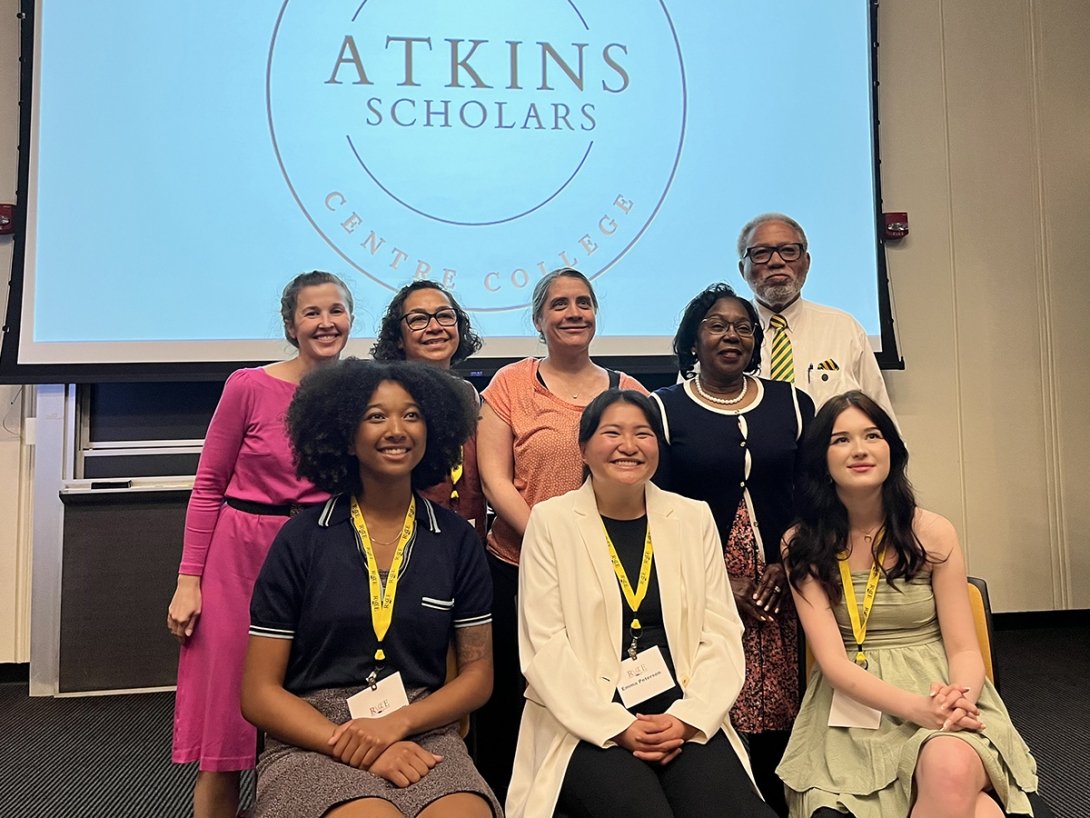
A Centre College research program has opened doors for students pursuing individualized research opportunities.
The Atkins Scholars Research Program, funded through the James Graham Brown Foundation, has helped to fund 30 research projects — both collaborative with faculty and individual research projects. The research program goal is to prepare scholars to confidently integrate inclusion and equity practices in future professional and academic endeavors.
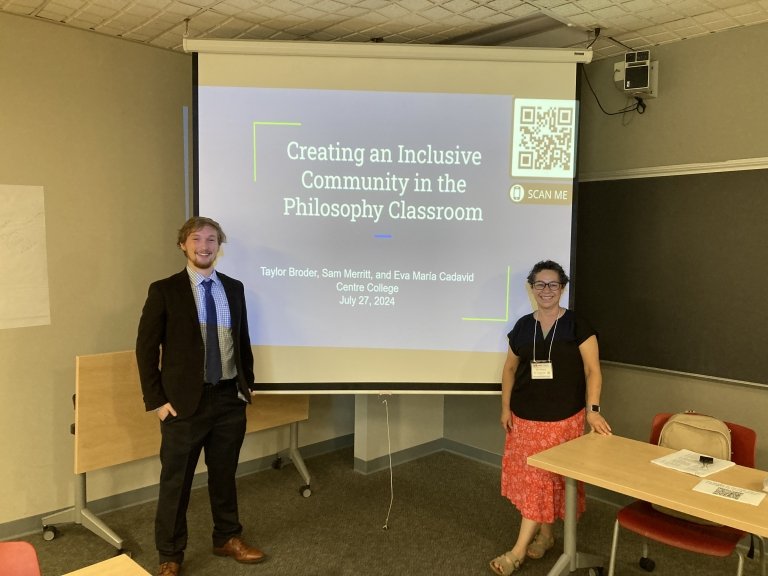
Eight scholars completed faculty mentored projects over the summer. Half of Centre faculty conduct research each summer, and providing mentored research opportunities to students through this work is an important way Centre supports high impact practices.
“I think the beauty of this opportunity for students is that we’re able to provide research opportunities for a diverse group of students,” said Melinda Weathers, director of diversity and inclusion at Centre and chair of the program. “They can study and further engage or explore topics that they are passionate about, while working closely with a faculty mentor.”
For junior Boston native Santiago Lebron, one linguistic anthropology class with Assistant Professor of Anthropology Jeffrey Shenton inspired a new research topic.
“Throughout that semester, Dr. Shenton was very open to talk about my personal interests and ways to follow them. That made me see him as a mentor,” Lebron said. “And as someone who is thinking about grad school, I knew I needed more time with him outside of the classroom. When he told me about his research plans for the summer, I was quick to say yes, because I also believed in the work he was doing and was fascinated by his approach.”
Lebron is working with Shenton on Participatory Action Research in the classroom through Black Oral History — and found a passion for Danville, Kentucky in the process, learning more about the cultural erasure endured by African Americans in the Danville and Boyle County community.
“As we worked through the oral history interviews he and Centre students have collected, I noticed that I was not asking enough questions about the place I decided to spend four years pursuing my undergrad,” Lebron said. “Through the interviews, I was able to hear the voices of a community who lost so much. After working with Dr. Shenton, I can say that I have a better idea of where I am right now and how that knowledge and the curiosity to have it, will get me where I want to be in the future.”
For Aidan Jackson, a member of the 2025 class and Business major, his research on men’s mental health had a personal twist. He said that seeing the challenges faced by his father as a Black man in America —and continuing to see them, through his own life and that of his peers —motivated him to act.
“Seeing friends, colleagues, classmates, teammates suffer through similar mental health challenges and remain quiet because of a personal stigma behind it is something I could not stand to keep watching,” Jackson said. “Change has to be made; and what better place to do so then at Centre College? (My) project is for black men on this campus who need support, community and tools to understand and examine their emotions, to further become competent as to how to approach sensitive subjects and know that it's okay to need help.”
When students have completed their research, opportunities like presenting at conferences, submitting for publication and sharing findings with RICE — Centre’s Research, Internships and Creative Endeavors showcase — allow students to share their work in a professional setting.
“Students last year noted that they weren’t sure about their work when they started — they couldn’t see themselves as a researcher,” Weathers said. “But upon interviewing people, listening and asking questions, they found how important it was, they felt like they were making an impact with these people who hadn’t been listened to. The research is validating, this work is important, and I think it changes students’ view of themselves moving forward.”
List of Atkins Scholars 2024-25
Bon Bartholomy ‘25
Major: Studio art and art history
Hometown: Owensboro, Kentucky
Faculty Advisor: Andy Brown
Topic: Fluid: Perceptions of identity at Centre College
Samuel Cotthoff ‘26
Major: Anthropology/Sociology
Hometown: Hopkinsville, Kentucky
Faculty Advisor: Jamie Shenton
Topic: The queer+ experience in Greek life at Centre College
Conley Combs ‘26
Major: Anthropology/Sociology and Spanish
Hometown: Boston, Massachusetts
Faculty Advisor: Kaelyn Wiles
Topic: Safety and sexual wellness of gay adolescent hookup app users and implications of hookup culture on the gay community
Keely Faulkner ‘26
Major: Classics and Anthropology
Hometown: Peachtree City, Georgia
Faculty Advisor: Danielle La Londe
Topic: Use of Roman exemplars and iconography by women's rights advocates in the Progressive Era
Creyling Guerrero '26
Advisor: Satty Echeverria
Topic: Constructing Blackness in Latin American Black-authored literature
Aiden Jackson ‘25
Major: Business
Hometown: Louisville, Kentucky
Faculty Advisor: Genevieve Bell
Topic: Examining the cultural competency of men’s mental health and re-imagining support: a black perspective
Sarah Koch ‘25
Major: Anthropology/Sociology
Hometown: Louisville, Kentucky
Faculty Advisor: Jamie Shenton and Philip Limerick (two research projects)
Topic: Parental rights in education and Anti-racist discourse on Afro-Uruguayan social media
Santiago Lebron ‘26
Major: Anthropology/Sociology and Spanish
Hometown: Boston, Massachusetts
Faculty Advisor: Jeffery Shenton
Topic: Participatory action research in the classroom through Black oral history
Sam Merritt ‘25
Major: German and Anthropology/Sociology
Hometown: Lexington, Kentucky
Faculty Advisor: Eva Cadavid
Topic: The role of inclusive pedagogies in developing a sense of belonging in the philosophy classroom
Nick Minton ‘26
Major: Anthropology/Sociology
Hometown: Brownstown, Indiana
Faculty Advisor: Katrin Bahr
Topic: “From inviting in, to coming out:” The ballroom community/ voguing scene
Kasey Montgomery ‘25
Major: Anthropology/Sociology
Hometown: Clayton, California
Faculty Advisor: Kaelyn Wiles
Topic: Loneliness and connection at Centre
Robyn Tribolet ‘25
Major: Studio Art and Art History
Hometown: Louisville, Kentucky
Faculty Advisor: Stephanie Galli
Topic: The power of queer community in times of protest
Jennifer Vong ‘25
Major: Sociology
Hometown: Louisville, Kentucky
Faculty Advisor: Kiyona Brewster
Topic: What does sexuality have to do with being Asian American in the United States?
William Watson ‘26
Major: International Studies and French
Hometown: Nashville, Tennessee
Faculty Advisor: Willie Costley
Topic: Immigration rhetoric during the 2016 presidential election cycle
Taylor Webb ‘26
Major: Psychology
Hometown: Nashville, Tennessee
Faculty Advisor: Drew Morris
Topic: Young adult cancer mental healthcare: "The Young Adult Cancer Compendium"
Maya Anderson '25
Faculty Advisor: Kristen Kolenz
Weathers added that the scholarship wouldn’t be possible without the Brown Foundation’s support of students to explore these diverse topics.
“We’re very grateful for the Brown Foundation’s support,” she said. “We’re excited to continue that relationship — it’s crucial for students to have access to funding, for good mentorship and this research. It’s an opportunity for us to compensate mentors in a small way, but also without the additional funding, students are limited on options when it comes to research projects. The Brown Foundation has recognized the importance of providing students with adequately funded, well-planned research opportunities in the areas of social justice. In many cases, these types of opportunities wouldn’t be available without that support.”

